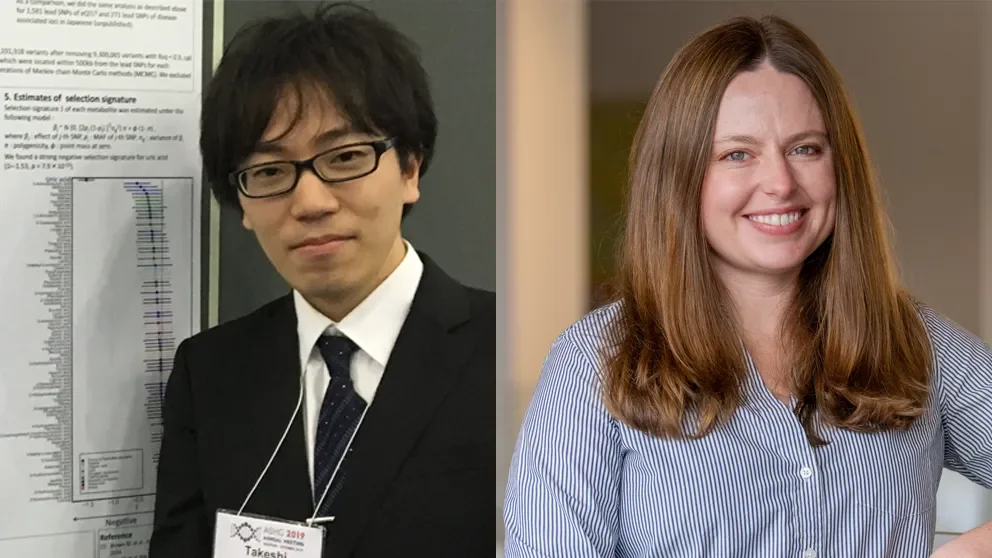Budding experts in the fields of immunology and microbiome named as 2024 JAX Scholars
Featured Article | March 11, 2024
“We are very proud of our JAX Scholars. They are wonderful examples of our diverse community of postdocs who creatively apply their expertise to uncover the genetic underpinnings of human health,” saysMeredith Theeman, Ph.D., Director of Predoctoral and Postdoctoral Education. “Dr. Iwasaki and Dr. Severn exemplify the value in assembling an interdisciplinary group of scientists with different academic backgrounds who can leverage their collective knowledge toward successful research outcomes.”
The variant investigator
With a wealth of experience in the clinical field, Takeshi Iwasaki, M.D., Ph.D., is determined to have a positive impact on patient outcomes. During his residency, Iwasaki managed multiple cases where patients’ diagnoses led to a dead-end, with too little known about their specific condition to provide them with targeted treatments. Despite the tremendous amount of progress over the past decade to identify genes and regulatory elements in the human genome, cases like those Iwasaki encountered are still far too common, and there remains a pressing need to link genetic variants to disease presentation or risk. Identifying the actual genetic culprits amidst the vast number of potential disease-contributing factors is a difficult task, but Iwasaki is up for the challenge as he pursues his career as a physician-scientist.

Iwasaki’s graduate research focused on complex autoimmune diseases, including the study of rheumatoid arthritis patients’ responses to tumor necrosis factor inhibitor (TNFi), one of the key drugs in treating the disease. His findings uncovered a systemic pattern of events occurring in TNFi non-responders. Using this information, he was able to create a tool to predict when the treatment would be ineffective for these patients. Iwasaki also profiled 581 clinical presentations for systemic lupus erythematosus, better known as lupus. He uncovered 26 correlations among clinical sub-phenotypes of the disease and created an accurate statistical model to calculate the probability of exhibiting 10 out of 20 phenotypes. Much of this work hinged on identifying what genomic variants were associated with these autoimmune diseases, but findings in the transcriptome, the collection of all RNA or gene readouts, left Iwasaki with the desire to know more.
“When I observed how the transcriptome is elevated with specific diseases, I realized I could not prove the causality of this phenomenon,” says Iwasaki. “This drove me to pursue a postdoctoral position to acquire specific experimental techniques to prove what was causing these changes.”
Iwasaki will be joining JAX Associate Professor Ryan Tewhey, Ph.D., as a postdoctoral associate this spring. He will be continuing his work identifying variants responsible for autoimmune disease onset by establishing a platform that uses cutting-edge assays to understand how variants in the genome impact disease risk, including high-throughput CRISPR screens. Unraveling the effects of genomic variants will help Iwasaki and colleagues in theTewhey lab determine the precise genetic mechanisms influencing autoimmune disease, potentially paving the way for novel therapeutic approaches.
“We are delighted to have Dr. Iwasaki join our group. His clinical experience and expertise in human genetics will be a perfect complement to the diverse group of engineers, biologists, geneticists and computational scientists in the Tewhey Lab. I am excited to work with Dr. Iwasaki to apply the tools we develop to investigate the genetic causes for autoimmune disorders,” says Tewhey.
“I am honored to receive the JAX Scholar award. This is the first time I have received this kind of support,” says Iwasaki. “I am excited to work with Dr. Tewhey as our interests and current research align. With my background as an M.D. and computational skills, I believe I will be able to meaningfully contribute to the scientific world.”
The microbe whisperer

Driven by her curiosity, Morgan Severn, Ph.D., is committed to making an impact on human health. Although initially unsure of her career path, Severn identified her passion for research after her undergraduate internship in a microbiology laboratory, where she realized there was still much to uncover about how we interact with the billions of microbes living in and on us.
“When I found microbiology, it felt like a natural fit for me,” says Severn. “I love being around people who are inquisitive and excited about asking interesting questions related to microbial physiology and the microbiome.”
During her graduate studies, Severn explored microbial quorum sensing, also known as microbial communication, with a focus on how common members of the skin microbiota interact. She was most interested in uncovering the communication strategies of the understudied types of staphylococci naturally residing on the skin. One of Severn’s key findings highlighted thatS. aureus, a common and widespread bacterial pathogen known to cause severe skin and soft tissue infections, quorum sensing could be blocked by another ubiquitous colonizer of the skin,S. hominis, which prevented S. aureus from causing infections. Now as part of the Oh lab, Severn studies staphylococci as well as another common member of the skin microbiota known asCorynebacteria. Despite Corynebacteria being some of the most abundant bacteria on the skin, little is known about how they interact with their human hosts. Severn hypothesizes that they likely play an important role in maintaining balance on and within the skin.
“We are currently growing Corynebacteria on human skin organoids to see how these tissues respond. We have observed a distinct category of bacteria that do not stimulate an immune response, while another subset of the bacteria is much more pro-inflammatory. Now we are trying to understand and dissect what makes these two groups unique from each other and between strains,” says Severn.
With further study, Severn believes there is potential to use skin microbes likeCorynes or Staphy as biotherapeutics to treat common skin diseases such as eczema or acne. By taking members of an individual’s own microbial community, genetically repurposing them and then reapplying them to the skin, it may one day be possible to treat these common dermatologic problems. Severn is grateful for the unwavering support and mentorship provided by Julia Oh, Ph.D., and is confident that working at JAX will prepare her for running her own lab one day.
“Dr. Severn is an outstanding expert in staphylococcal biology. It will be so exciting to see how she will continue to integrate her classical microbiology training with cutting-edge ’omics approaches to blow open the field’s understanding of host–microbiome interactions in the skin,”says Oh.
“JAX is a supportive and inclusive place to do great science,” says Severn. “Dr. Oh has been a fantastic mentor and always wants to help us utilize the services and resources available. The support for trainees here allows us more opportunities to ask and answer important biological questions.”

